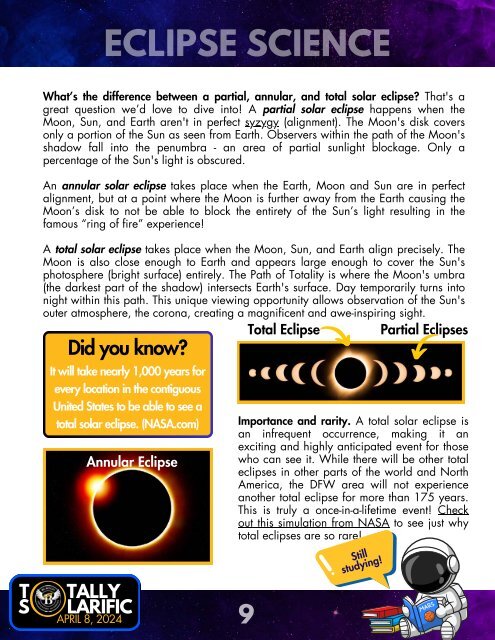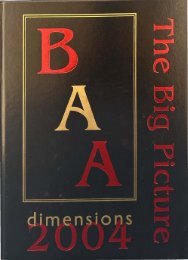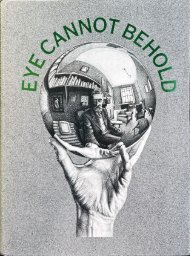BAA Solar Day Guide Version 2.0
You also want an ePaper? Increase the reach of your titles
YUMPU automatically turns print PDFs into web optimized ePapers that Google loves.
ECLIPSE SCIENCE<br />
What’s the difference between a partial, annular, and total solar eclipse? That's a<br />
great question we’d love to dive into! A partial solar eclipse happens when the<br />
Moon, Sun, and Earth aren't in perfect syzygy (alignment). The Moon's disk covers<br />
only a portion of the Sun as seen from Earth. Observers within the path of the Moon's<br />
shadow fall into the penumbra - an area of partial sunlight blockage. Only a<br />
percentage of the Sun's light is obscured.<br />
An annular solar eclipse takes place when the Earth, Moon and Sun are in perfect<br />
alignment, but at a point where the Moon is further away from the Earth causing the<br />
Moon’s disk to not be able to block the entirety of the Sun’s light resulting in the<br />
famous “ring of fire” experience!<br />
T<br />
S<br />
A total solar eclipse takes place when the Moon, Sun, and Earth align precisely. The<br />
Moon is also close enough to Earth and appears large enough to cover the Sun's<br />
photosphere (bright surface) entirely. The Path of Totality is where the Moon's umbra<br />
(the darkest part of the shadow) intersects Earth's surface. <strong>Day</strong> temporarily turns into<br />
night within this path. This unique viewing opportunity allows observation of the Sun's<br />
outer atmosphere, the corona, creating a magnificent and awe-inspiring sight.<br />
Did you know?<br />
It will take nearly 1,000 years for<br />
every location in the contiguous<br />
United States to be able to see a<br />
total solar eclipse. (NASA.com)<br />
Annular Eclipse<br />
TALLY<br />
LARIFIC<br />
APRIL 8, 2024<br />
9<br />
Total Eclipse<br />
Partial Eclipses<br />
Importance and rarity. A total solar eclipse is<br />
an infrequent occurrence, making it an<br />
exciting and highly anticipated event for those<br />
who can see it. While there will be other total<br />
eclipses in other parts of the world and North<br />
America, the DFW area will not experience<br />
another total eclipse for more than 175 years.<br />
This is truly a once-in-a-lifetime event! Check<br />
out this simulation from NASA to see just why<br />
total eclipses are so rare!<br />
Still<br />
studying!












